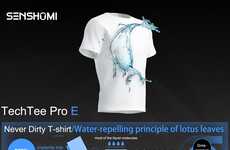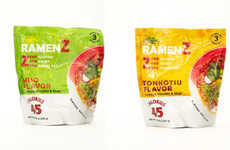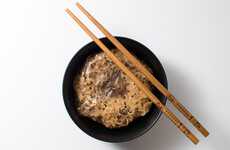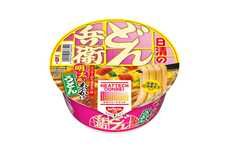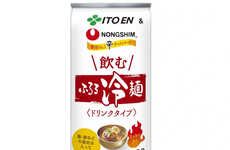
Ziorich Debuts an Anti-Stain 'Ramen T-Shirt' for Fighting Splatter
References: ziorich.jp & hypebeast
Ziorich has invented a new ‘Ramen T-shirt’ that is entirely stain-resistant and allows consumers to enjoy their favorite ramen without worrying about staining their clothing. The T-shirt is aimed at consumers who intensely dislike getting stains on their clothing while consuming soup-based dishes, as these stains are typically harder to remove from lighter clothing.
Zurich acknowledges that in traditional Japanese culture, it is customary to slurp ramen so that the flavors of the broth and the ingredients can complement each other. Unfortunately, this often causes the broth to splash onto your clothing while eating. The ‘Ramen T-Shirt’ resists stains and can remove splatter with water and a napkin. The shirt has not yet been tested with other food, but it is predicted to possess the same anti-stain properties.
Image Credit: Ziorich
Zurich acknowledges that in traditional Japanese culture, it is customary to slurp ramen so that the flavors of the broth and the ingredients can complement each other. Unfortunately, this often causes the broth to splash onto your clothing while eating. The ‘Ramen T-Shirt’ resists stains and can remove splatter with water and a napkin. The shirt has not yet been tested with other food, but it is predicted to possess the same anti-stain properties.
Image Credit: Ziorich
Trend Themes
1. Stain-resistant Clothing - Developing fabric that is stain-resistant has the potential to disrupt the fashion industry by changing traditional laundry habits and expanding the use cases for versatile clothing.
2. Food-safe Fashion - Combining fashion with food safety creates innovation opportunities to design clothing suitable for messy food consumption, like protective aprons or bibs.
3. Sustainable Textiles - Adopting sustainable materials like bamboo, hemp, or organic cotton in the production of stain-resistant clothing can lead to eco-friendly, long-lasting, low-maintenance wardrobe options.
Industry Implications
1. Food and Restaurant Industry - The food and restaurant industry can collaborate with fashion brands to develop branded stain-resistant clothing for customers and staff, generating additional revenue and improving workwear functionality.
2. Workwear Industry - The workwear industry can benefit from manufacturing stain-resistant uniforms for workers in industries that involve food handling, like food service, catering, or hospitality.
3. Fashion Industry - The fashion industry can embrace stain-resistant fabrics to create new collections that cater to practical-minded consumers, offering versatile, low-maintenance clothing that saves time and money while reducing environmental impact.
4.9
Score
Popularity
Activity
Freshness


